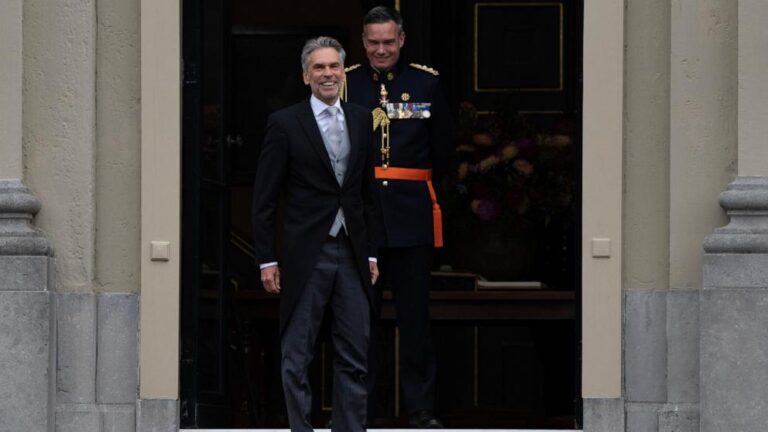THE HAGUE, Netherlands — The Netherlands has a different prime minister for the first time in 14 years, with Dutch King Willem-Alexander sworn in Tuesday as the country’s new government, more than seven months after elections dominated by a far-right, anti-Islam party.
Dick Schoof, the former head of the Dutch intelligence agency and the Counter-Terrorism Office, signed the official royal decree at Huis Ten Bosch Palace, saying he “declared and promised” to fulfill his duties as the country’s prime minister. The 67-year-old was officially installed alongside 15 other ministers who make up the country’s right-wing coalition.
Activist Geert Wilders’ anti-immigration party won the largest share of seats in last year’s elections, but it took 223 days to form a government.
The new coalition was quickly criticized for its anti-immigration measures, by its own members as well as by opposition groups. Protesters gathered outside the palace where the ceremony took place on Tuesday, with one woman carrying a placard asking: “Are we democratically getting rid of our democracy?”
The four parties in the coalition are Wilders’ Party for Freedom, outgoing Prime Minister Mark Rutte’s centre-right People’s Party for Freedom and Democracy, the populist Citizens’ Peasant Movement and the centrist New Social Contract party.
The formal agreement creating the new coalition, called “Hope, Courage and Pride,” introduces tough measures on asylum seekers, removes family reunification for refugees and seeks to reduce the number of international students studying in the country.
Opposition from other coalition partners prevented the controversial Wilders from taking over as prime minister. During months of negotiations, he backtracked on several of his most extreme positions, including withdrawing a bill that would have banned mosques, Islamic schools and the Koran.
For the first time since World War II, the Netherlands is led by a prime minister who is not affiliated with any political party. Before heading the Dutch intelligence agency, Schoof was responsible for the fight against terrorism and the country’s immigration and naturalization service.
The other government ministers were sworn in on Tuesday, according to their seniority in their respective departments. One minister, Femke Wiersma, who will head the agriculture portfolio, made her statement in Frisian, the country’s second official language after Dutch.
Although the November elections were widely seen as a victory for the far right, political youth organisations are already opposing the ambitions of the new government. Ahead of the inauguration ceremony, youth groups from six parties, including two of the coalition partners, called for a relaxation of the asylum plan.
“Although the influx must be limited, it is very important that we receive people here in a fair and dignified manner,” Eva Brandemann, chairwoman of the youth wing of the New Social Contract, told Dutch public broadcaster NOS.
His counterpart from Rutte’s party, which brought down the government last summer over concerns about the number of refugee family reunifications, said the problems lay with the administration, not migration.
“The problem will only get worse if you don’t solve it,” Mauk Bresser, chairman of the youth organization of the People’s Party for Freedom and Democracy, told The Associated Press.
While Bresser believes that the number of refugees arriving in the Netherlands should be reduced, his group believes that the applications of those already here should be processed as quickly as possible and given the opportunity to integrate.
The new deal cuts the country’s education budget by nearly €1 billion, sparking opposition from universities. “Students won’t get the education they deserve,” Nivja de Jong, a language professor at Leiden University, told the AP. She is part of a group of academics who are opposing the proposed cuts by giving lunchtime lectures about the importance of their research.
The new government will now spend the summer consolidating the coalition agreement into a governance plan.
The Netherlands is not alone in seeing a rise in far-right and anti-immigration sentiment. Last month’s European elections saw a similar shift, and French voters face a crucial choice on July 7 in a second round of snap parliamentary elections that could see the country’s first far-right government formed since the Nazi occupation of World War II.


